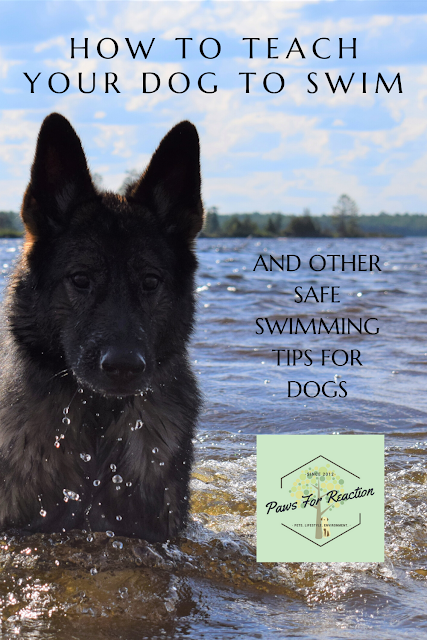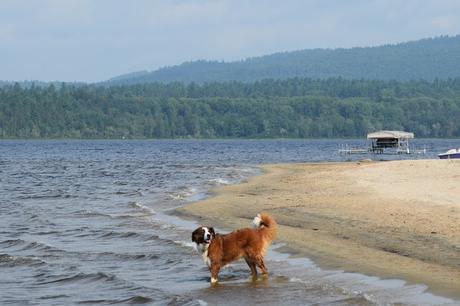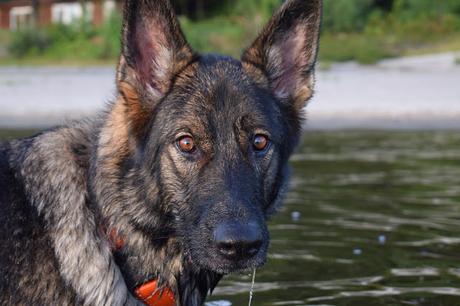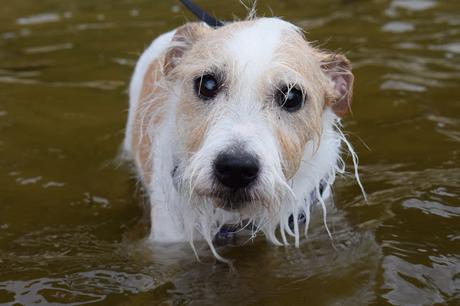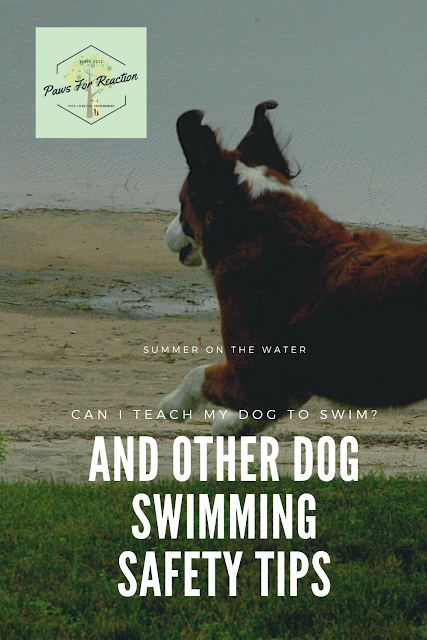Summer on the water: Can I teach my dog to swim? (and other dog swimming safety tips)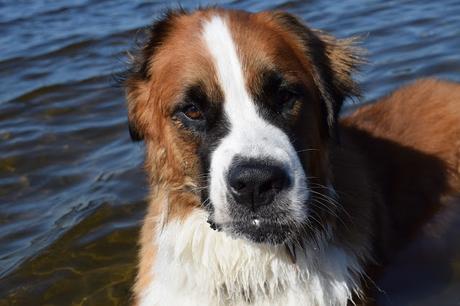
This post contains affiliate links
The sun is hinting towards warmer weather and that means it’s almost time for my dogs to go swimming! Some dogs- like mine- love the water. Before taking the plunge, make sure you are prepared to take your dog swimming safely. Swimming and other water play with your dog is a great way to beat the heat and can be a bonding experience. Whether you go to a swimming destination or are just swimming in the backyard pool, safety precautions must be taken.
Can I teach my dog to swim?
First, you must determine that your dog is physically capable of swimming. If you have any worries or doubts about your pet’s swimming capabilities it’s best to consult your veterinarian. Avoid taking young puppies swimming. Senior dogs should be observed closely as they may have health issues that will make it more difficult for them to enjoy the water. If you are really unsure test your dog in the bathtub, kiddie pool or any other controlled area to see how it reacts. You may need to teach your dog to swim, but most learn naturally. That’s why they call it the doggy paddle!

Keeping my dog safe while swimming
On hot days, monitor your dog for heatstroke. Make sure you know the signs of heatstroke in your dog. I always recommend that your dog is up to date on all vaccinations and medication to prevent fleas, ticks, ear mites, worms, and other parasites. Dogs who like water should get the Leptospirosis vaccine. It will protect your dog against the Leptospira bacteria that causes this bacterial infection. Puddles, slow-moving streams, and other stagnant water can harbor the bacteria. Infected wildlife that your dog may encounter on a trip to the lake can spread the bacteria by urinating in a standing water source. If your dog drinks it, then she could contract Leptospirosis- which is zoonotic, meaning it can be passed to humans!
Bring some food and clean drinking water. Try to avoid letting your dog drink non-flowing or unclean water as much as possible. If your pooch eats a big meal avoid swimming for an hour- especially if you have a large, deep-chested dog. Like Hazel! These dogs are prone to bloat. Make sure to give your dog breaks in the shade to recoup from all the fun in the sun! When dock diving or playing fetch with a floating toy make sure you have a safe, clean area where your dog has enough room to maneuver and its feet won’t be hurt by sharp rocks. Try it out in shallow water first just to be safe. Always bring a towel for your pet and make sure you dry the dog’s ears well so they don’t become infected- especially floppy-eared dogs like mine! Some dogs may need dog life-preserver, especially on boat rides. It can save their life in an emergency. Avoid salt-water- dogs can become sick from salt-intoxication. Only swim with your dog in freshwater and don’t allow your dog to drink from the ocean. Be aware of any aquatic creatures in the area that may pose a threat to your dog.
Can my dog swim in my pool? Some dogs like swimming in pools, without the fear of sharp rocks on the bottom or predatory marine creatures. Although humans can handle swimming in chlorinated pools, a dog’s ears, nose, and eyes are much more sensitive to the chemical. It’s not recommended that your dog swim in a chlorinated pool and dogs should never drink large amounts of chlorinated water. Try purchasing a dog-friendly pool cleaner! If you allow your dog to swim in a chlorinated pool use low levels of chlorine and always rinse your dog with fresh water after swim time is over. Provide clean drinking water for your pooch so there’s no reason to drink from the pool. Hazel always had her own kiddie pool I filled with fresh water, and she lived in it during the hot summer months. Keep in mind that it’s easy for your dog to get into the pool. but it may not be easy for your dog to get out. Give your canine companion a helping hand out of the pool to create a positive experience from start to finish. If you plan on having your dog poolside it’s best to fence the area around the pool. That way you can close off the pool area when you don’t want your dog swimming. Dog’s enjoy (or don’t enjoy) the water in different ways. The most fun thing about introducing water to your dog is learning and discovering together. The bonding experience is rewarding and the health benefits are many. Test the waters with your dog. You never know- you may just dive into a whole new relationship!
Dog swimming checklist: I've made an easy reference list of things to bring when swimming with your dog. I've also linked to some adorable products you can purchase from Etsy to support small businesses!
- Towels to dry off your dog
- Ear wipes or ear cleaner
- dog life preserver or dog swim vest
- Plenty of fresh, clean drinking water
- First aid kit that also includes quick stop, tweezers for removing ticks, contact information for nearby emergency veterinary service
- Sunscreen for dogs with close-cropped fur, light-coloured nose or sensitivities to the sun
- Food, treats and other training tools
- Dog hat to prevent heatstroke
- Umbrella or another tool used to provide shade
- Poop bags
- Leash and collar with identification
- Paw protection wax for hot sand
- Floating toys
Give me a high paw and follow Paws For Reaction on PinterestLike Paws for Reaction on Facebook
Follow @PawsForReaction on Twitter
Follow my blog and subscribe in the sidebar >>

